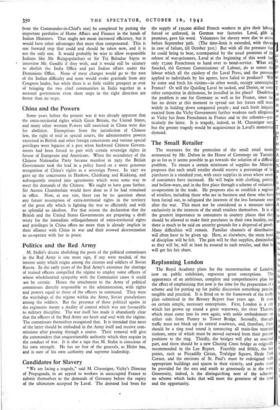Politics and the Red Army
M. Stalin's decree abolishing the posts of the political commissars in the Red Army is one more sign, if any were needed, of the intense unity which reigns among the citizens and soldiers of Soviet Russia. In the early years of the Red Army's existence the shortage of trained officers compelled the regime to employ some officers of whose wholehearted sympathy with the Communist cause it could not be certain. Hence the attachment to the Army of political commissars directly responsible to the administration, with rights and powers equal to those of the officers in command. They were the watchdogs of the regime within the Army, Soviet proselytisers among the soldiers. But the presence of these political agents in the regiments meant a duality of control which was not favourable to military discipline. The war itself has made it abundantly clear that the officers of the Red Army are heart and soul with the regime. The commissars themselves recognised that. It is intended that most of the latter should be embodied in the Army itself and receive com- missions after passing through a course. Their removal will give the commanders that unquestionable authority which they require in the conduct of war. It is also a sign that M. Stalin is conscious of his own strength. He has no fear of the generals, as Hitler has, and is sure of his own authority and supreme leadership.


























 Previous page
Previous page